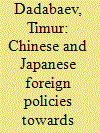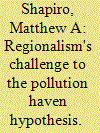|
|
|
Sort Order |
|
|
|
Items / Page
|
|
|
|
|
|
|
| Srl | Item |
| 1 |
ID:
127799


|
|
|
|
|
| Publication |
2014.
|
| Summary/Abstract |
This paper compares and analyses China's and Japan's foreign policies with regard to the newly emerging Central Asian (CA) states based on the role that each country attributes to that region, including political cooperation, economic interaction, security, public perception and mutual relevance. It demonstrates that in some respects, the interests of China and Japan in CA are similar, as exemplified by their focus on mineral resources and political stability. However, these countries differ in their approaches and strategies there: China is inclined to follow pragmatic approaches, whereas Japan's policy is a mixture of idealistic and pragmatic perspectives.
|
|
|
|
|
|
|
|
|
|
|
|
|
|
|
|
| 2 |
ID:
127796


|
|
|
|
|
| Publication |
2014.
|
| Summary/Abstract |
Although most North Koreans say 'yes' in front of power to avoid trouble, they murmur something different behind its back. The main goal of this paper is to investigate the 'hidden transcripts' of the ordinary powerless in contemporary North Korean society. Based on refugee testimonies, the paper examines how mere mortals question, mock, and challenge official rhetoric of the regime at the ever-prospering markets. In particular, a discourse analysis of 'those who think differently' and a practice analysis of 'those who act differently' are provided. The long-term effects of hidden transcripts of the ordinary powerless on the evolution of the North Korean system are discussed in the conclusion.
|
|
|
|
|
|
|
|
|
|
|
|
|
|
|
|
| 3 |
ID:
127798


|
|
|
|
|
| Publication |
2014.
|
| Summary/Abstract |
This paper examines the impact of economic factors on bilateral trade flows between Malaysia and the GCC through estimations of panel data using a gravity model. In particular, the paper compares the determinants of bilateral trade and trade potentials between Malaysia and two regions, the non-traditional Gulf alliance and the traditional ASEAN counterpart, to provide insights for leveraging opportunities through trade with the former. The gravity estimates imply the importance of size effects, similarities in GDP and differences in factor endowments as drivers of trade flows between Malaysia and the GCC, underlying the fact that inter-industry trade dominates these flows. The opposite holds in the case for the Malaysia-ASEAN trade. Though export potentials for industrial products per se appear exhausted in trade with both regions, the Gulf region provides opportunities for Malaysia to export quantity-based final (end-use) products and to diversify its exporting strategy away from quality-based parts and components.
|
|
|
|
|
|
|
|
|
|
|
|
|
|
|
|
| 4 |
ID:
127794


|
|
|
|
|
| Publication |
2014.
|
| Summary/Abstract |
The conventional understanding of Japan's approach to East Asian regionalism is that of a primacy struggle with China, using both hard and soft balancing. However, Japan's strategic priority remains extending and managing the alliance with the US in the post-Cold War era. The increasing trilateral dynamics among China, Japan and the US have largely influenced Japan's perception of its position in the alliance, which frames the basic thinking of Japan's attitudes toward regionalism. Japan's policy and diplomacy toward regionalism have been subordinate to alliance management rather than to a strategic policy shift. Meanwhile, Japan's perception of its regional influence vis-à-vis China also affects Japan's calculation in regionalism.
|
|
|
|
|
|
|
|
|
|
|
|
|
|
|
|
| 5 |
ID:
127797


|
|
|
|
|
| Publication |
2014.
|
| Summary/Abstract |
Unlike other surviving communist regimes (China, Vietnam, Cuba), North Korea has not been able to achieve sustained growth by reforming its economy. This article will trace the failure of economic reform in North Korea to the prevailing system of political governance based on Monolithic Leadership System (MLS) reinforced by Military First Politics (MFP). The political risk aversion of the MLS-MFP system permits only an ultra cautious reform strategy, but the potential of even ultra cautious reform cannot be fully realized. The detrimental effects of the MLS-MFP system include: excessive restriction of the development of grassroots capitalism; entrenchment of the wasteful economics of militarization and the perpetuation of international isolation. The combination of stubborn regime under economic duress sets off a vicious circle of economic failure, anti-marketization, and external confrontation. Escape from this predicament depends on external initiative focused on steering the regime back onto the path of ultra cautious reform, especially by easing its need for militarization. The viability of such an initiative depends on the extent the US is prepared to accept the regime in its current form.
|
|
|
|
|
|
|
|
|
|
|
|
|
|
|
|
| 6 |
ID:
127795


|
|
|
|
|
| Publication |
2014.
|
| Summary/Abstract |
This paper explores the phenomena of environmental coordination within Northeast Asia. I initially frame the discussion around claims that China is a pollution haven for its neighboring countries, and I look for evidence in the domestic and regional environmental institutions which challenge China's pollution haven status. I find that that there is a science and technology-based epistemic community in Northeast Asia which provides an important theoretical response to counter the pollution haven hypothesis. As well, given its strong science and technological output, Japan is poised to assume leadership of the Northeast Asian environmental regime for at least the short- to medium-term.
|
|
|
|
|
|
|
|
|
|
|
|
|
|
|
|
|
|
|
|
|